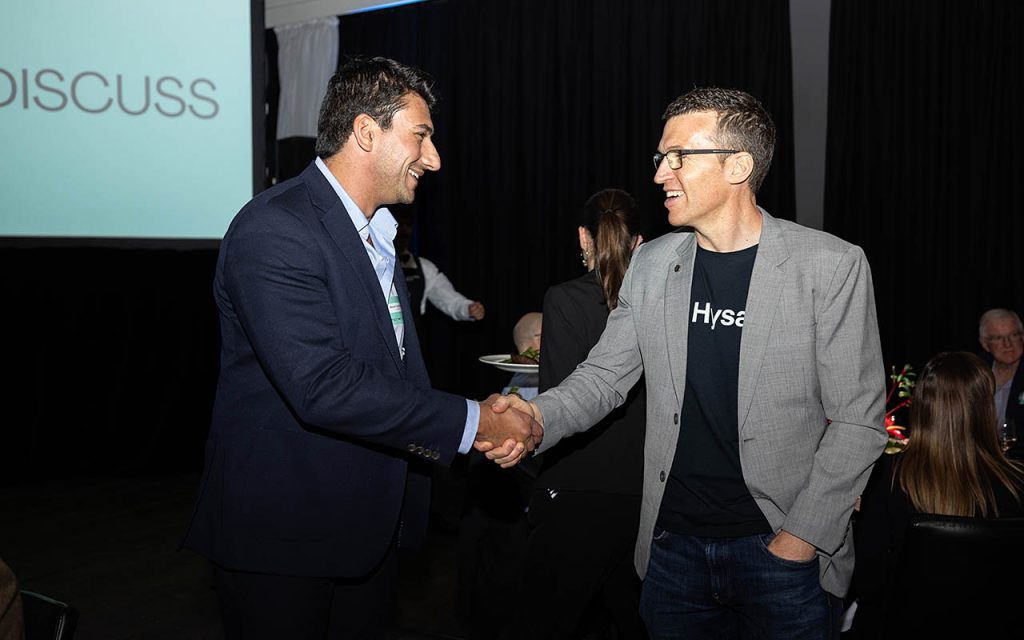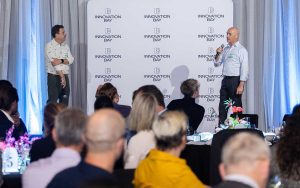Innovation Bay and ARENA: Be brave, go hard and fast
ARENA and Innovation Bay’s Renewables Startup Showcase unveiled a new format – less competition, more discussion, more insight and an emerging key theme.

‘Go hard, go fast, have big, big ambitions.’
Novalith CEO and founder Steve Vassiloudis
ARENA and Innovation Bay’s Renewables Startup Showcase unveiled a new format this year, allowing the heads of deep tech renewable startups to share their experiences and hopes for the future.
Previous years have seen the event conducted along competitive ‘Shark Tank’ lines. Renewable energy execs alone on-stage, pitching to an audience of around 100, including potential investors.
The event, this year jointly hosted in Melbourne by ARENA and startup and investor community organiser Innovation Bay, adopted a more relaxed interview format. Although, in a twist, there still turned out to be a competitive finale. More on that later.
Along the way, we learned of guest speaker and global renewable energy pioneer and influencer, slash entrepreneur, slash author (you get the picture) Danny Kennedy’s solar epiphany in the highlands of Papua New Guinea.
And ARENA CEO Darren Miller’s admission he once herded his three children on to the roof of his solar-panelled Sydney roof home for a photograph to appear in the Australian Financial Review.

Back to business
A key theme to emerge over the evening was encouragement for startups to be brave and forthright in their ambitions. But more than that, for investors, policy makers and government to adopt the same mindset.
“Go hard, go fast, have big, big ambitions,” said Novalith CEO and founder Steve Vassiloudis.
Novalith’s technology uses CO2 to extract lithium from hard-rock resources, such as a mineral called spodumene, which make up roughly 60 per cent of the world’s lithium resources.
As Mr Vassiloudis puts it, the technology’s genesis came about by accident.
“A team at the University of Sydney was looking at ways to sink CO2 into rock,” he said.
“Spodumene was one of them and through that they realised that, hey, you can sink CO2 into the rock. But an unexpected outcome was that lithium came out, selectively.”
With funding from the Clean Energy Finance Corporation (CEFC), Novalith developed its technology and is now aiming to move towards commercialisation.
“We have been able to rapidly scale from milligrams to grams to tens of grams. But this is insignificant to the eight million tonnes we will be needing in the early 2030s.”
‘More risk appetite’
Sicona CEO and founder Christiaan Jordaan put it differently. “Just go swing for the fences.”
Mr Jordaan is no stranger to risk, having investigated mineral deposits in remote regions.
“I started with a graphite deposit in Mozambique, of all places,” he said.
Sicona combines silicon metal with carbon to produce silicon-carbon (SiC) anode materials for next generation lithium-ion batteries.
“We produce [silicon metal] nanoparticles and then coat that with carbon and assemble it into larger particles,” Mr Jordaan said.
“It creates a final product which looks and feels like graphite and materials”, Mr Jordaan said. With its significantly improved energy density, it’s a product “that…customers want.”
Sicona, like Novalith, is a deep tech company which has had difficulty raising significant capital investment. “I think that’s the reason I have almost no hair left,” Mr Jordaan said.
“It was really tough, took way longer than anticipated and it was very, very draining emotionally, but we eventually found the right path forward.”
What could Australia do better to fund startups like Sicona?
“Australia has a natural advantage in critical minerals and raw materials. We should just be going really hard into those areas,” Mr Jordaan said.
Changing investor behaviour
Hysata CEO Paul Barrett recently hosted Minister for Climate Change and Energy Chris Bowen and Mr Miller at the hydrogen electrolyser company’s new production facility in Wollongong.
Hysata is much further down the capital raising road – over $43 million from private equity, the CEFC and venture funding, plus $30 million ARENA grant funding to scale up and commercialise its new hydrogen electrolyser technology.
Mr Barrett highlighted how that important injection of investor confidence affected Hysata.
“If I look at everyone’s timeline, and if we dialled back ten years ago, no one would be raising $50 million or more in Australia,” he said.
“That really gave us the capital to, and this is not meant to be disparaging, act a bit more American. To have high ambition with the capital, to build the team and get equipment so we can compete at scale.
“So, we’ve signed 15 GW of conditional orders for electrolysers – each gigawatt is about US$500 million. So, these are big orders for delivery, kind of second half of the of the decade and that’s what we are scaling up towards.”
‘We can do that too’
Renewable Metals CEO Luan Atkinson said hearing from the other three startup CEOs offered many positives.
“Sometimes it feels like we’re still pretty early stage,” she said.
“To actually see people like Hysata and Novolith and Sicona and see what they’ve been able to achieve, it’s really encouraging actually to say well we can do that too.”
Renewable Metals novel technology recycles battery waste into battery metals to be used again and again. The secret sauce is an alkali leach used to extract the metals, rather than the acids used by existing recyclers, chiefly in China.
“What that means is it allows us to specifically target the metals that we’re seeking to recover,” Mrs Atkinson said.
“So, lithium, nickel, copper and cobalt, manganese. Acid pretty much dissolves everything, so there’s a lot of chemical consumption through the process, whereas we can recycle our [alkali] leach.
“It’s really important that as we look to recycle the batteries, we’re not actually creating a different environmental problem.
“And someone came up to me tonight and said: ‘Oh, I know this great strategic partner, like you mentioned you were looking for in this industry’. So, to get that out of it [the Innovation Bay event] was great.”
The twist in the tail
Hopefully you’ve been taking notes because in a final twist, the Innovation Bay evening did indeed take a competitive turn.
More than a hundred guests were asked to vote, table by table, for their preferred startup story.
So, if you were asked to ‘swing for the fence’ and back one out of Novalith, Sicona, Hysata or Renewable Metals, who would you go all-in with?

Andrew Webster